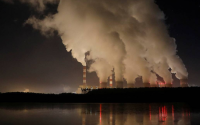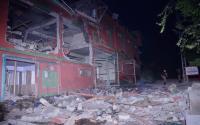Euan FergusonSunday December 23, 2001The Observer We looked forward, way back then. It seems hard to credit, but at the very start of 2001, 255 days before that one unconscionable morning, we were looking blearily forward, with vague and not even too cynical hopes for a peace process or two, for a healthy economy; some hoped for something to be done about world debt, or something to be done in Labour's second term. We looked forward and we foresaw nothing.
Better to have looked back, for that was the year that was to come. Back to the Crusades and ancient hatreds. To caves and famine; ancient Muslim scripts and high, forgotten mountain passes. To Nostradamus, and to a medieval disease which swept our countryside. To big, rusting bombs and subterranean retreats. To wizards and dragons, goblins and Hobbits. To old, simple angers and old, simple stupidities and the suffering of innocents.
January Early on the morning of 1 January, as blizzards scoured our fields and coasts, they closed and bolted the doors on the wretched Dome for the last time, but in vain; like Quatermass's Pit, its curse had one more to claim...
As a desultory Britain yawned its way back to work, the Maha Kumbh Mela festival in India drew 100 million pilgrims to the banks of the Ganges, making it the greatest-ever gathering of humans on the planet, although it was a close-run thing between this and the Saturday queues outside Oxford Circus Tube: it was announced that the transport shambles had, since October, cost 30 million working hours in London alone.
The tanker Jessica managed to shed 160,000 gallons of oil off the coast of South America. Fortunately, the spill only washed over the wildlife of the Galapagos Islands , where Darwin had first theorised on the survival of the fittest: it didn't harm the island of Roatan, where the cream of evolution had begun filming Temptation Island, a study in exploitative cuckoldry.
Tony Banks tried to save the pigeons of Trafalgar Square from the crude despoliations of Ken Livingstone, whose ban on feed-sellers was itself having unforeseen ecological effects, chief among them being the ability of humans to survive in central London for an hour without being smeared in guano or attacked by flying rats.
Prince Charles fell off a horse, broke his shoulder and called himself a 'plonker'. Princess Margaret was rumoured to have had another stroke, although this didn't stay the hand of the Mail's Lynda Lee Potter, who diagnosed: 'Princess Margaret is vivid proof that we end up with the appearance we deserve. She looks what she is, which is a bitter, unhappy, selfish old woman.'
James Bulger's killers, Robert Thomson and Jon Venables, due for imminent release, won court protection to have their new identities concealed - to predictable outrage. The Post Office changed its name to Consignia; the ridicule died a little when it was remembered that daft, expensive rebrandings almost always herald massive lay-offs: see December.
Peter Mandelson resigned, again , after The Observer asked him about Srichand Hinduja's passport application. Two days after the story, the party's famous spin machine tangled its bolas round its own ankles: the original line from Alastair Campbell, that Mandelson had 'forgotten' a call made when the Hindujas were offering £3 million to the Dome's failing faith zone, was subsequently denied by Mandelson. A furious Downing Street forced his resignation the next day, Campbell having reportedly reached the end of his tether with a man who, for all his propagandist skills, seemed hopelessly naive over the way his own actions could be interpreted in print. His departure was mourned with exuberance.
Auberon Waugh, who once wrote 'It is a sad fact of journalism that people only tell you your stuff is any good after you stop writing it', died... to pages of tributes on how good his stuff was.
As the Government won a Lords vote to extend the laws on embryo research, we were introduced to Andi, the world's first genetically modified monkey, who had been implanted with a gene from a glowing jellyfish. He looked radiant.
Outside the FA's headquarters in London, a man called Ray Egan protested in full John Bull outfit, insisting that the appointment of Sven-Goran Eriksson would mean the death of English football. Streakers were introduced to Subbuteo.
Bill Clinton, the man Harold Evans called the 'emperor of empathy', stepped, for a while from the world stage, most of the many peccadillos of his presidency forgotten as the West realised the man had at least possessed a discernible personality and, at one time, some principles. He left incoming President George W. Bush the customary hand-written note in the Oval Office, and Hillary left one for Laura; many Democrat staffers left chewing-gum under their chairs.
Ally McBeal actress Calista Flockhart adopted baby Liam, weighing in at a fine 7lb 4oz, though records are still hazy as to the weight of the child. In Britain, a survey showed the average age of marriage for men had risen above 30 for the first time. It was announced that an operation could stop people blushing. Not an operation needed by Alan and Judith Kilshaw , who sparked months of debate over parenthood and dress sense after buying baby twins on the net and bringing them here after kidnaps and car chases through America. The baby girls, who have now had four names and counting, were later returned.
The year began badly, again, for the NHS, when piles of bodies were shown being stored 'temporarily' in a chapel of rest in Bedford. The Sun's Richard Littlejohn asked, with heroic economy of taste: 'In the light of the NHS hiring nurses with HIV, I have one question about that photo. Were those corpses patients or staff?'
On 10 January, an Egyptian flying from Madrid to Miami was questioned for an hour by immigration officials, their suspicions raised by the fact he wanted to take flying lessons, even though he was entering on a tourist, not a student, visa. After being interviewed by a second agent, according to the Miami Herald, he was released. His name was Mohamed Atta.
February In Cuba, sweetly enough, an excited Fidel Castro slipped backstage to ask for the autographs of the Manic Street Preachers. In England, Eminem was banned from rapping at Sheffield University. Tom Cruise and Nicole Kidman, Hollywood's goldenest couple, announced they were to split, and Naomi Campbell announced she was to launch a campaign for better rights for celebrities. Edward and Sophie Wessex began their own annus horribilis by being pictured drinking chummily with Jorge Haider, leader of Austria's Freedom Party.
Peter Mandelson fought back, saying his resignation had been a mistake. He was defended by, among others... no, forget that: he was defended by the author Robert Harris, who compared his plight to that of Alfred Dreyfus. Britain yawned, fed up with the whole thing, and Alastair Campbell said that his old colleague was 'slightly detached'.
America bombarded Colombian villages with weedkiller, which managed to poison a number of peasants along the way. And America and Britain bombed Iraq, massively, to a chorus of protest from Russia, China and the Arab world. Britain held its first Holocaust Memorial Day, and Israel swung to the right, with Ariel Sharon replacing Ehud Barak: commentators blanched as they took stock of the health of the eight-year-old Oslo peace process.
A ship carrying 900 Iraqi Kurds, barely alive in stinking conditions, ran aground off the Cote d'Azur; as France debated what to do with them, Britain quietly announced a get-tough policy on asylum-seekers. A survey showed that 66 per cent of Britons have no knowledge of any language except English.
Abdelbaset Ali Mohmed Al Megrahi was jailed for a minimum of 20 years for his involvement in the downing of Pan Am 103 over Lockerbie, but his co-defendant, Al Amin Khalifa Fhima, was found not guilty, after a lengthy and incredibly complex trial in Holland. The uneasy suspicion remained that they were footsoldiers, and a higher power - Muammar Gaddafi was most often named - should be held to account.
Tony Blair went to Washington and, apparently, bonded with George Bush: asked what they had in common, Bush replied: 'We both use Colgate toothpaste.'
The Royal Mail, or whatever it was called by then, refused to deliver letters to a 'disgusting' estate in Portsmouth.
One morning, at an abattoir in Essex, foot-and-mouth disease was detected in pigs; this was the first time it had been found in this country for 20 years. The EU banned the export of British meat and milk, and was told it was overreacting. By the end of the month, newspapers were full of grim pictures of piles of burning slaughtered animals. The countryside closed down, the Countryside Alliance cancelled its planned March protest, and there were calls for the election to be postponed.
A report was made to the Senate Select Committee on Intelligence, by George Tenet of the CIA, on a man named Osama bin Laden. '[He] and his global network of lieutenants and associates remain the most immediate and serious threat [to US security],' said Tenet. 'He is capable of planning multiple attacks with little or no warning.'
March Hear'Say, the fabricated band which had enthralled Popstars viewers since the turn of the year, burst on to Top of the Pops with a winning number entitled 'You Really Don't Need This Information, Trust Me, And It's Going To Take A Minute Of My Life Which I Won't Get Back To Look It Up', and the increasingly extraordinary Lynda Lee-Potter described pretty singer Kym as 'undeniably too big around the middle'.
A clever Gordon Brown Budget managed to please just about everyone. William Hague tried to scare everyone with a speech beginning: 'Let me take you on a journey to a foreign land...' A man making toast one morning found a ghostly image of Hague had appeared on its surface.
In Italy, Professor Severino Antinori announced he planned to produce human clones. In America, Parkinson's patients who had received brain implants of cells from aborted foetuses developed some grim side-effects, including constant wrist-flapping and 'chewing movements'. Peter Tatchell was beaten up for trying, rather bravely, to make a citizen's arrest on Robert Mugabe for human rights breaches in Zimbabwe. Mr Lars Back, Sweden's 'gender equality' adviser, harassed stewardesses on a flight to New York before vomiting in the lap of his boss, the (female) Equality Minister. A Palestinian suicide bomber killed two Israeli teenagers waiting for a bus.
George Best fell off the wagon , again. Mir fell back to earth, landing near Fiji. Unemployment in Britain fell below one million for the first time since 1975, but, as the US stock market dropped, there was talk of another global recession.
The Government reluctantly ordered the indiscriminate slaughter of all pigs, sheep and goats around any outbreak of foot and mouth in Dumfries and Galloway and in Cumbria. The Army was put on alert, but warned it might not have enough bullets to kill all the sheep. By the end of the month, a vast grave had been dug in Cumbria, containing 500,000 slaughtered beasts; the chief scientific adviser was warning that unless diseased victims were killed within 24 hours half the animals in Britain might die; Tony Blair had authorised instant slaughter of any livestock, sick or healthy, within three miles of an outbreak; and vaccination was explored, despite being called the last resort only four weeks earlier. Blair also decided to postpone the election, despite the fact that 3 May had been the expected date for two years.
As the pandemic grew ever worse, France, Germany and Spain branded Britain the 'sick island' of Europe. The Wall Street Journal joined in, telling us: 'One in five adults in the land of Shakespeare is functionally illiterate. The public services on which the country depends for its long-term economic health are in a state of extreme decay. The healthcare system belongs on life support.'
The Real IRA detonated a bomb at the BBC's news centre in White City. Ten people died in the Selby rail crash when a Land-Rover, its driver asleep at the wheel, slipped on to the line.
Anne Robinson upset the Welsh. Phil Mitchell was shot. Ann Gloag, head of Stagecoach, gave up her billion-pound international empire to work with Aids victims on a hospital ship in Africa after her son's suicide. We started to fall for Sven, and all things Svedish, after England beat Albania 3-1.
A mufti in Saudi Arabia delivered a fatwa against Pokémon cards.
April 'You'll never take me alive,' vowed Slobodan Milosevic on April Fool's Day. He was arrested within the week.
It was announced to the Sun that the 3 May election was off; the Government graciously confirmed as much to Parliament, and the country, 24 hours later. Eagerly the country began to debate the issues of principle which would decide the election... or we would have, had there not been so many other distractions.
Sophie, Duchess of Wessex, was exposed in the News of the World after speaking to a 'fake sheikh' and offering him 'access' to the royal family if he paid enough to her PR company. She compared Hague to a puppet and talked of her royal connections as an 'unspoken benefit' of using her firm. After the first week's story broke, as Buckingham Palace held its head in its hands, she attempted damage limitation by giving an interview to the same paper, in the hope of being seen in a better light and calming the controversy. It splashed, that next Sunday, with the headline 'My Edward Isn't Gay'.
The Sunday Mirror countered by collapsing the trial of two Leeds footballers, after £8m of public money had been spent, when it suggested there was racial motivation behind their attack on Sarfraz Najeib, after the judge had instructed the jury to discount this. Japanese scientists announced a breakthrough - they had found a way to turn newspapers back into wood.
Israeli helicopters fired rockets into the Gaza Strip after a Palestinian mortar attack badly wounded a Jewish baby and his mother. Since violence flared again the previous September, it was reported, 458 people had been killed: 375 Palestinians, 64 Israeli Jews and 19 others. Israel then sent tanks into the Gaza Strip, an action condemned as 'excessive and disproportionate' by Colin Powell.
Railtrack was thrown another £1.5bn of public funds. SouthWest Trains was given another 20-year franchise, to amusement and fury. Marks & Spencer suffered a calamitous dip in profits and pulled out of Europe.
Tiger Woods became the first simultaneous holder of the Masters, Open, US Open and US PGA titles. Richard Guest won the Grand National on Red Marauder, though an easier race could have been run in the trenches of the Somme; only four horses finished, to astonished and guilty applause from sodden crowds.
Perry Wacker, the driver of a lorry in which 58 Chinese illegal immigrants died, was jailed for 14 years. Bush refused to endorse the Kyoto agreement as 'against US interests', to fury from environmentalists and even some indignation from members of the British Cabinet.
A man died in a swimming pool belonging to Michael Barrymore. The Weakest Link, exported to the US, gave NBC its biggest ratings since the Sydney Olympics, even though Anne Robinson had to be given 24-hour protection from angry Americans.
New Zealand scientists said the most likely origin of BSE in Britain was an antelope imported to a wildlife park in the Seventies and turned into cattle-feed on its death. After eight weeks of foot and mouth and more than a million animals slaughtered, the pandemic showed few signs of slowing. But the policy of slaughtering both healthy and sick animals was proving increasingly hard to watch. After one calf, born on Good Friday, lay for five days beside the rotting body of her mother, having been missed by the Maff guns, then stood up and tottered towards the farm's owners, they called the local press. She was christened Phoenix, and she won (as they say) the hearts of a nation. The Government's slaughter policy changed immediately, although it insisted this was coincidence.
New Labour still looked unstoppable as Tory infighting continued with gusto and Hague's lurch to the Right proved increasingly misjudged.
Nights of violence in Bradford followed a Hindu wedding. In Oldham, gangs of young Asians were accused of indiscriminate racial attacks on whites, particularly after Walter Chamberlain, 76, was found with broken cheekbones. Tony Blair attempted to fight 'yob culture' by offering free CDs to kids who didn't mug people.
On 26 April, in Tamarac, near Fort Lauderdale, Mohamed Atta, driving a red 1986 Pontiac, was stopped on the road by Broward County sheriff's deputies. He had no licence and received a citation. He failed to turn up the next month and a warrant was issued for his arrest. It went unenforced.






